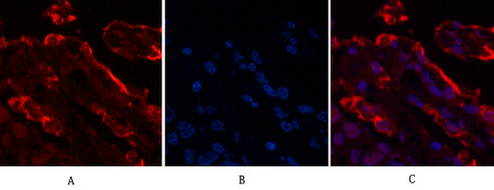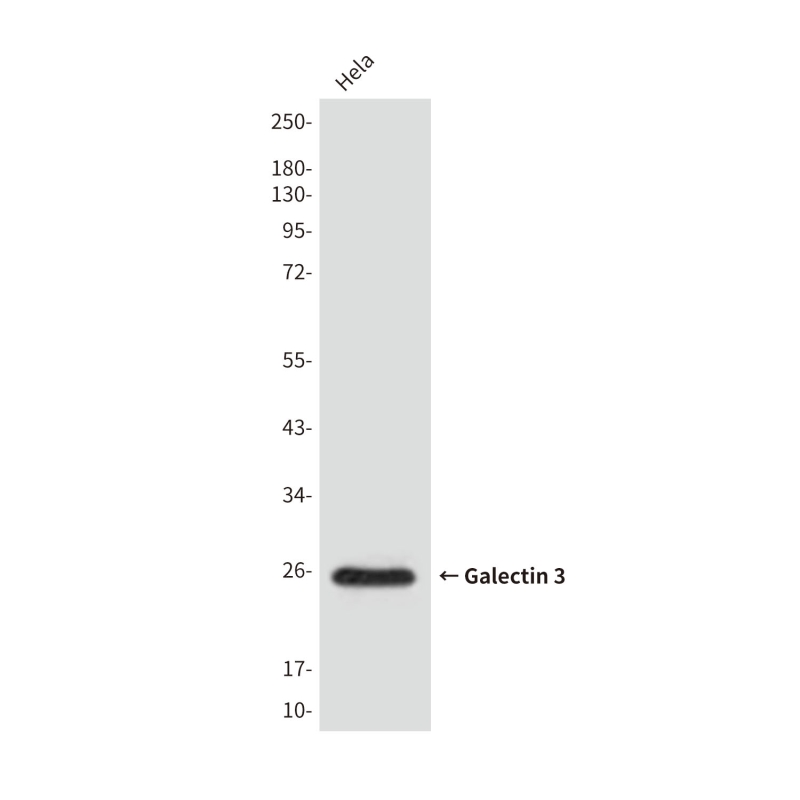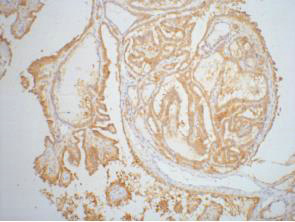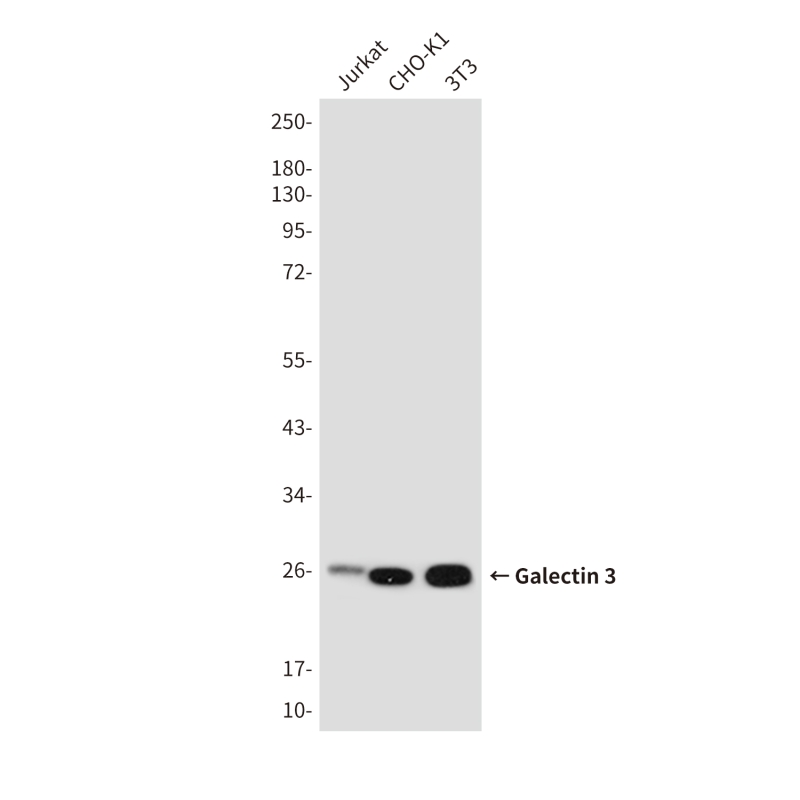



| WB | 咨询技术 | Human,Mouse,Rat |
| IF | 咨询技术 | Human,Mouse,Rat |
| IHC | 1/50-1/100 | Human,Mouse,Rat |
| ICC | 1/50-1/200 | Human,Mouse,Rat |
| FCM | 咨询技术 | Human,Mouse,Rat |
| Elisa | 咨询技术 | Human,Mouse,Rat |
| Aliases | LGALS3 |
| Entrez GeneID | 3958 |
| clone | 7A2 |
| WB Predicted band size | Calculated MW: 26 kDa; Observed MW: 26 kDa |
| Host/Isotype | Mouse IgG1 |
| Antibody Type | Primary antibody |
| Storage | Store at 4°C short term. Aliquot and store at -20°C long term. Avoid freeze/thaw cycles. |
| Species Reactivity | Human,Mouse |
| Immunogen | Synthetic Peptide of Galectin-3 |
| Formulation | Purified antibody in PBS with 0.05% sodium azide,0.5%BSA and 50% glycerol. |
+ +
以下是3篇关于Galectin-3抗体的代表性文献摘要(信息经简化整理):
1. **文献名称**: *Galectin-3 as a multifunctional regulator of cellular processes in fibrosis, cancer, and inflammation*
**作者**: Liu FT, Rabinovich GA
**摘要**: 本文综述Galectin-3蛋白在炎症、纤维化和肿瘤进展中的多重作用,强调其抗体在阻断Galectin-3介导的细胞黏附和信号通路中的治疗潜力,尤其在抑制肿瘤转移和器官纤维化方面的应用。
2. **文献名称**: *Diagnostic and prognostic value of Galectin-3 in heart failure using a high-sensitivity immunoassay*
**作者**: de Boer RA, et al.
**摘要**: 研究通过高灵敏度Galectin-3抗体检测技术,验证Galectin-3作为心力衰竭的生物标志物,发现其血浆水平与心肌纤维化程度及患者不良预后显著相关,提示其临床诊断价值。
3. **文献名称**: *Targeting Galectin-3 with neutralizing antibodies inhibits pancreatic cancer progression by modulating tumor-stroma crosstalk*
**作者**: Chen SS, et al.
**摘要**: 实验表明,Galectin-3中和抗体可阻断胰腺癌细胞与肿瘤微环境中成纤维细胞的相互作用,抑制肿瘤生长和化疗耐药性,为靶向Galectin-3的抗体治疗提供了临床前证据。
(注:以上为简化示例,实际文献需通过PubMed或Web of Science等数据库检索获取全文信息。)
Galectin-3 (Gal-3), a β-galactoside-binding lectin, plays multifaceted roles in cellular processes including proliferation, apoptosis, adhesion, and inflammation. Structurally, it contains a carbohydrate-recognition domain (CRD) enabling interactions with glycoproteins and glycolipids. Gal-3 is implicated in pathological conditions such as cancer progression, fibrosis, and chronic inflammation, functioning both intracellularly (e.g., regulating signaling pathways) and extracellularly (e.g., modulating immune responses). Its overexpression correlates with tumor metastasis, angiogenesis, and therapeutic resistance, making it a biomarker of interest in cancers (e.g., thyroid, breast) and fibrotic diseases (e.g., cardiac, hepatic).
Galectin-3 antibodies, developed as research and diagnostic tools, target specific epitopes to inhibit Gal-3's pathological interactions. These antibodies enable mechanistic studies by blocking Gal-3-mediated pathways in vitro and in vivo. Clinically, they hold diagnostic potential; for instance, elevated Gal-3 levels detected via immunoassays aid in stratifying heart failure severity or cancer prognosis. Therapeutically, anti-Gal-3 antibodies and inhibitors (e.g., GB0139. a Gal-3 inhibitor in clinical trials for pulmonary fibrosis) aim to disrupt Gal-3-driven fibrosis or tumorigenesis. Challenges remain in optimizing specificity and delivery, but Gal-3-targeting strategies represent promising avenues for personalized medicine in oncology and fibrotic disorders.
×